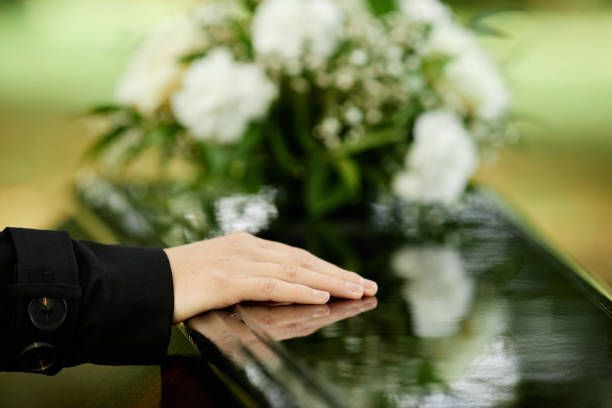
I grew up in Malaysia and married an American and have not thought of death and burials till my in-laws passed away. They were Catholics and the burial was traditional American, as were their graves. Recently, I was at the funereal of a friend who had died and as a Muslim, was buried the traditional way after the ritual washing and blessings, in a simple cemetery. On the opposite spectrum, I had a colleague from Africa who told me about her uncle passing and how her family was organizing a large funeral for him nine months after his death as the family was scattered all over the world. I did not see nor participate in the funeral, but the event was a multi-day event that was both sad and a celebration of life at the same time. The idea of a body waiting months before a funeral was difficult for me to processes as Muslims make every effort to bury the dead within 24 hours.
Funerals, like marriages, are a time to pull the family together. Interestingly, even with funerals, people see it as an opportunity to make or strengthen connections. It may be because people appreciate the finite time they have with others. Whatever it is, inevitably families that are spread out physically or by strained familial ties come together at funerals.
Putting the dead to rest is a very personal task to Muslims. Most times, the sons of the deceased will be asked to help in laying the body into position of facing Mecca inside the grave. Typically, the sons do not have experience with this, but other members of the Muslim community help with instructions that are sometimes funny and sometimes poignant. Although it is a sad time, the confusion and cacophony of suggestions helps with the sadness. Even though the cemetery staff can do everything, it is considered a privilege for the sons or close male relatives to do the last thing they can for their parent.
I grew up in Malaysia and am struck at the differences between cemeteries where I grew up and those in the United States. In the U.S., Muslims can choose to be buried in a Muslim cemetery or the Muslim corner of regular cemeteries. Cemeteries are normally situated on soft rolling hills or on flat cleared areas with each plot having a headstone, or flat marker, although there are fancier plots. Many cemeteries in the U.S. prefer flat to the ground headstones and few flowers, bushes, or trees as it is easy to mow the grass to keep the cemetery neat. In my home country, Muslim cemeteries are lovely, shaded gardens. Each burial plot has a head stone, cylindrical to show the deceased was a male or flat for females, and a foot stone. The fancier plots have raised ledgers where flowering and fragrant bushes sprout. Shade trees are planted to “provide shade for the deceased.” This all makes walking through a Muslim cemetery in Malaysia a cool respite from the heat of the tropics. I also grew up with prohibitions of crossing over a person’s body, so a lawnmower crisscrossing burial plots fills me with horror at the transgression towards the deceased!
As I contemplate my demise, I have many thoughts on how to be buried. Since my soul will hopefully be in Jannah, I believe the best way to leave this earth is to fertilize the soil. Since all bodies will decompose eventually, I have wondered if anyone would be horrified that I am contemplating being buried with mushrooms to speed up the breakdown process.
(all opinions expressed by guest contributors are theirs and not necessarily reflective of views of MyLLife)

